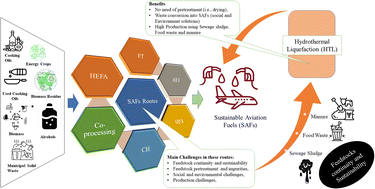The future of aviation soars with HTL-based SAFs: exploring potential and overcoming challenges using organic wet feedstocks
Abstract
The aviation sector is responsible for a significant portion of the world's GHG emissions. In order to attain net-zero carbon emission targets by 2050, a transition to sustainable aviation fuel (SAF) from traditional fossil jet fuel is crucial. Renewable energy and the bioeconomy are expected to boost “drop-in” aviation biofuel production in the coming years. The methods and feedstocks used to produce SAFs are currently unable to even meet a small percentage (less than 1% of the jet fuel demand). In response, this review outlines the state-of-the-art SAFs-certified technologies currently in use, including “hydroprocessed esters and fatty acids (HEFA), Fischer–Tropsch (FT), alcohol-to-jet (ATJ), catalytic hydrothermolysis (CH), and hydroprocessing of fermented sugars (HFS)”, while also highlighting process challenges and restrictions. Additionally, it offers fresh perspectives on the prospective technique hydrothermal liquefaction (HTL) and potential local feedstocks (such as sewage sludge (SS), food wastes (FW), and animal manure) for the production of sustainable, ecologically friendly, and cost-effective SAFs. HTL is a viable alternative technology for converting biomass, avoiding the energy-intensive drying stage to produce high-quality bio-crude. It is a useful process for turning wet waste, such as SS, FW, and manure, into SAFs (coupled with hydrotreating), as opposed to the usual disposal incineration method. These feedstocks produce a significant amount of bio-crude, are continuously available, and have a net positive cost. However, HTL has not been commercialized yet for the production of SAF. Therefore, this review also offers several suggestions that should be seriously considered to make it possible for commercial use.



 Please wait while we load your content...
Please wait while we load your content...